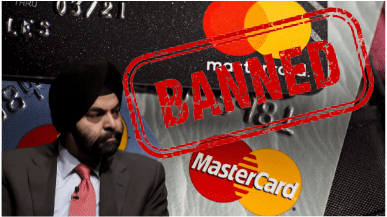- Mastercard CEO Ajay Banga and Richard Verma wanted lax treatment on data localisation norms, but RBI has banned Mastercard.
- With the ban on Mastercard, now Visa is the only international player in the Indian market allowed to issue new cards.
- The ban on Mastercard is also a message to big tech companies like Facebook, Amazon, and Twitter that as long as they are ready to comply with the law of the land, they are welcome otherwise, they would face the same fate as Mastercard.
Mastercard, led by Indian-American CEO Ajay Banga, is defying the norms of the Indian regulators and wants to continue business as per its whims and fancies. The Indian-American CEO of the company wants special treatment for the company just because he is of Indian origin, but RBI banned it from authorizing new cards last month.
Richard Verma, another Indian American, appointed as America’s ambassador to India by the Obama Administration and held the post till 2017, is now the Global Public Policy lead of Mastercard.
The duo, Banga and Verma, wanted lax treatment towards Mastercard on the data localisation norms, but after repeated advice and ample time to implement the warnings, RBI finally decided to teach them a lesson and, now Mastercard has lost the lucrative India market.
The global digital payments agencies do not store the data in India and never paid a single penny in taxes. Previous governments could not take any strong steps against these multinationals because India did not have any payment interface of its own.
After the country developed its infrastructure of payments with UPI and Rupay, RBI ordered foreign companies to save all the data for transactions taking place from October 2018, on the servers in India. “All System Providers were directed to ensure that within a period of six months the entire data (full end-to-end transaction details/ information collected/carried/ processed as part of the message/payment instruction) relating to payment systems operated by them is stored in a system only in India,” said the RBI 2018 circular.
The major digital transaction multinationals – Visa, Mastercard – said that they will oblige the order. Although Visa decided to comply with Indian norms of data localization, Mastercard tried to play a rebel like Twitter and, decided to not do the same despite repeated warnings from RBI in the last three years.
With the ban on Mastercard, now Visa is the only international player in the Indian market allowed to issue new cards. Now Mastercard is out of new trades – although it can keep the old cards running – and the old business is shrinking due to the resurgence of UPI and Rupay in the last five years. India does not even need Visa in the future because all international companies now built a payments platform based on UPI and Rupay for the Indian market.
In the pre-Modi era, international digital transaction players like Visa, Mastercard were involved in monopolistic practices as they were the sole players. They used to charge customers an outrageous processing fee and made card payments an elite practice. The Modi government launched the country’s own digital payments system and built infrastructure to encourage digital payments, and today it is the world’s most successful payments infrastructure in the world.
Now, foreign companies will also be taxed as per the tax laws of India. Till now these companies were out of the tax net of the country because they operated in India through offices in tax heaven countries like Singapore and, stored data in jurisdictions of the United States and Ireland. Given the fact that these companies have ‘permanent establishment’ in the country which means a physical presence through data servers. They will be taxed at 15 per cent, the tax rate for the companies which have invested in the country through their arms in countries like Singapore with which India has tax treaties.
The ban on Mastercard to acquire new customers would benefit the Rupay and UPI payments ecosystem. A few months ago, India overtook China in the number of digital payments per month, and given the fact that the country has such a robust payments infrastructure, it will not entertain the whims and fancies of American giants like Visa or Mastercard. The ban on Mastercard is also a message to big tech companies like Facebook, Amazon, and Twitter that as long as they are ready to comply with the law of the land, they are welcome otherwise, they would face the same fate as Mastercard.
